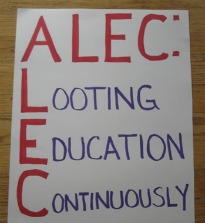 Rhode Island may be down to just five card-carrying ALEC members left in the legislature, but the Ocean State is still doing an exemplary job of implementing ALEC’s agenda.
Rhode Island may be down to just five card-carrying ALEC members left in the legislature, but the Ocean State is still doing an exemplary job of implementing ALEC’s agenda.
A new report that links the American Legislative Exchange Council with the State Policy Network (which funds the RI Center for the Freedom and Prosperity) cites five examples of how the “SPN Pushes ALEC’s Corporate-Sponsored Legislation.”(page 7 here)
Rhode Island is a national leader in three of the five policy proposals cited by the report, specifically: “Privatizing Public Education”, “Privatizing Public Pension Systems” and “Disenfranchising People of Color, the Elderly, and Students” (aka voter ID).
Here’s the full list from the report:
Attacking Workers’ Rights: ALEC’s “Right to Work Act ” seeks to limit the rights of workers to unionize in the private sector and undermine the power of unions to negotiate and protect workers. SPN member state think tanks have published articles and reports supporting “right to work” legislation in at least Alabama, Kentucky, Ohio, Delaware, Oregon, Minnesota, Indiana, Michigan, Maine, New Mexico, and Pennsylvania. Michigan’s operation, the Mackinac Center, was recently singled out by SPN for its efforts to push “Right to Work” into law in Michigan despite its long state record of support for workers’ rights to organize and collectively bargain. Who was there to tout this legislative victory that came over the objections of thousands and thousands of Michigan workers? Betsy and Dick DeVos, the extreme right-wing millionaires pushing an array of divisive and destructive legislative issues to suit their narrow personal views.SPN think tanks join ALEC in pushing a broad agenda to undermine other worker protection, including tearing down collective bargaining, prohibiting paid union activity in the form of “release time,” and ending the ability to deduct union dues from paychecks for private and public employees (so-called “paycheck protection”).
Privatizing Public Education: SPN think tanks join ALEC in pushing a broad education agenda to privatize public schools, including pushing for-profit online schools, for-profit and other charter schools, using taxpayer dollars for vouchers to for-profit schools, and even so-called “parent triggers” to allow a group of parents to close a public school for current and future students, andturn the school into a charter school or require a voucher system that takes away from traditional public schools.Privatizing Public Pension Systems: SPN think tanks join ALEC in pushing to privatize public employee pension systems that workers have negotiated for, making them 401(k)-style defined contribution type accounts rather than defined benefit plans. Such changes provide less retirement security for workers who have devoted their lives to public service and negotiated for such benefits to protect themselves and their families from poverty as they age. Additionally, 401(k) systems tend to include the diminution of benefits through corporations taking fees out of the pensioners’ funds, creating a lengthy revenue stream for the corporations that administer those plans, which often involves substantial income for the corporation relative to the work involved.Rolling Back Environmental Initiatives: ALEC’s “State Withdrawal from Regional Climate Initiatives“ would allow states to pull out of the Regional Greenhouse Gas Initiative or the Western Climate Initiative, cap-and-trade programs to cut greenhouse gases and carbon-dioxide emissions. It also uses language that denies the documented climate changes that are underway. SPN state think tanks have published articles and reports supporting states’ withdrawals from these regional initiatives in at least Alabama, Arkansas, Tennessee, Delaware, Oregon, New Jersey, Montana, Virginia, and Connecticut.Disenfranchising People of Color, the Elderly, and Students: ALEC’s restrictive “Voter ID Act ” makes it more difficult for American citizens to vote. It would change identification rules so that citizens who have been registered to vote for decades must show only specific kinds of ID in order to vote. This bill disenfranchises college students and many low-income, minority, and elderly Americans who do not have driver’s licenses but have typically used other forms of ID and proof of residency in the district. SPN state think tanks have published articles and reports supporting voter ID bills in several states, including Arkansas, Washington state, North Carolina, and Wisconsin.
And here’s the full report:


 A
A 



